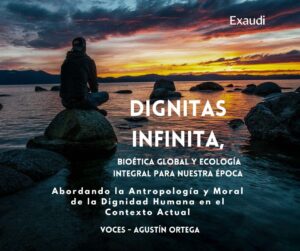The recent publication of the Dicastery for the Doctrine of the Faith, Dignitas infinite (DI) on human dignity, continues and deepens the teachings of Pope Francis, especially Fratelli tutti (FT) and including Laudato si’ (LS) or other teachings. United with his predecessors such as Saint John Paul II and Benedict XVI, he continues to delve into ethical and social issues (subjects) and their anthropological basis within the horizon of theology and inspired by faith. We are very happy to see that DI articulates and includes what we are constantly working on in our teaching and university research on dear Francisco, global bioethics, and integral ecology. Just as the Social Doctrine of the Church itself teaches us. And that I have also studied, as we are going to try to do in this article, exposing the respective responses or proposals to the questions and challenges raised in DI, which are not so explicit and treated.
A very coherent anthropology and morality of the dignity of the human being for our time, which addresses the social, political, economic, cultural, and spiritual problems and realities, promoting human development and integral ecology in inseparable connection with global bioethics. Firstly, it makes clear its metaphysical foundation with solid anthropology, the ontological and intrinsic dignity of every person, whose life and dignified existence is sacred and inviolable, beyond any circumstance or situation (DI 1). Life and dignity are inherent to the very nature of the person, which is in the deepest essence of the human being and roots a vigorous humanist ethic. In the light of faith, this transcendence and sacredness of people’s lives, with their inherent dignity, is embedded in the human being as the image, likeness and son of God as revealed to us by Jesus Christ who, in his incarnation, is united and present in each person (DI 2-5).
Hence, every harm, injustice and evil that is caused to any human being is inflicted on someone who is similar and a child of God, who is the real presence (sacrament) of God himself in Christ. And Jesus wanted to identify himself with each person, preferably with the poor, the victims and the excluded, as his own Gospel shows us (Mt 25, 31-46; DI 18-19). In this way, the ultimate theological foundation of the dignity of the person is Christ-centered and Trinitarian. The person is created by God the Father from his free love, he is saved by Christ until the giving of his life (being crucified) for our salvation and vivified in the Spirit, where every human being becomes a temple of this Lord and Giver of Life (LS 10; FT 2-5).
The biblical God, who is fully revealed in Jesus Christ, is the God of life, love and justice with the least, defender of the oppressed and excluded, the God of the poor, the victims and the crucified of history. . Therefore, the seriousness of denying this transcendence of life and dignity to any person who is called to this divinization is very clear, whose origin and destiny is communion with this God of life who, with his love, gives us the beauty of eternity. That new earth and new heavens, the eschatological-eternal existence (DI 11-12).
From this deep-rooted and transcendent pillar, as transmitted to us by Saint Thomas Aquinas himself and (similarly) contemporary currents of thought such as personalism with its relevant authors (DI 13), we must listen to the cry of the poor, of the victims and the cry of the earth. In the face of all this denial of the life and dignity of each person, integral ecology is established with its global bioethics that cares for, protects, defends and promotes the life and dignity of people in all phases of their development or aspects, already in the beginning until natural death (LS 115-122; FT 18-19). This essential life and dignity, which is inherent to the nature of the person, is the basis of human rights that are based on this integral anthropology and natural-moral law (DI 9). That is, the civil, political, social and economic rights of the person, enablers of integral human development, must recognize and protect this bio-corporeal, ecological, ethical and spiritual nature that makes up every person (DI 24-28).
A real human ecology, therefore, for the protection of the life of the human being from its very beginning with conception, where each unique and unrepeatable person already exists as science shows us, until the end of existence; with all the care that comes at the moment of his death (DI 47-54). Likewise, from the same scientific knowledge with its corresponding anthropology, it recognizes and promotes the biological-corporal, sexual and emotional diversity and complementarity of the masculine (man or man) with the feminine (woman) (DI 55-60). Thus, that sanctuary of love and life is established that culminates in marriage, the family with children, a school of sociability and ethical, civic and solidarity virtues at the service of the common good (LS 155; FT 208-209).
The social and environmental ecology that promotes social and international justice with the poor of the earth, who are subjects of its promotion that comprehensively liberates inequality and injustice (DI 36-37), and the intergenerational that takes care of that common home that it is the planet earth; with an economy at the service of needs, capabilities and human, sustainable and comprehensive development (LS 189-198; FT 103-105), ensuring the principle of the universal destination of goods that has priority over property. A civilization of work over capital, with its rights such as a fair salary (LS 124-129; FT 162), which rejects all trafficking, child slavery such as the work of minors and the exploitation of the worker, of women and immigrant (DI 41-46). What is substantiated in the civilization of poverty against that of wealth, constitutive of all authentic spirituality and holiness, with the solidarity communion of life, goods and action for justice with the poor, opposed to the false gods of money, of possessing, having and power (LS 93-95, FT 118-120).
In this direction, the solidarity globalization of peace with non-violence is possible (necessary). And this is against all war, any military aggression and arms industry, the death penalty, savage competitiveness, femicide or mistreatment of women and ecocide, a true ecological sin. Violence and attacks on decent living, in the same way to do lucrative business, such as digital manipulation, advertising that objectifies people – as it does with women, turning them into a disposable sexual object -, pornography, prostitution, gambling addictions or other addictions such as drugs including alcohol (DI 38-39; 44-46). This, urgently and indispensable, requires the prohibition of any war, the total, simultaneous and integral disarmament of the people, of each person, with their cultures and non-violent spirit. Wars with their weapons and such violence only generate destruction, death, revenge and hatred that poison the soul and moral conscience. We must give way to conflict resolution with diplomatic, legal, political, civic processes, dialogue and mediation for peace, a non-violent ethic (FT 256-262).
Without all of the above, without relationships and conditions and (political) institutions of all kinds such as socioeconomic and historical (structural) ones, there is no true freedom or peace, they become lies (DI 29-32). Justice (social and international) with human rights, inseparably linked to the common good and integral human development, truly make possible such free, peaceful and greenly democratic coexistence that is not real without this respect for the truth of the moral-natural law of human nature, with its inalienable life and dignity. All of this will be possible if we exercise fraternal and civil love, political charity, which seeks the civilization of love, the most universal good and the transformation of these personal, socio-structural and historical causes that impose this culture of death, an authentic structure of sin and common evil (LS 159, 228-231; FT 196).











